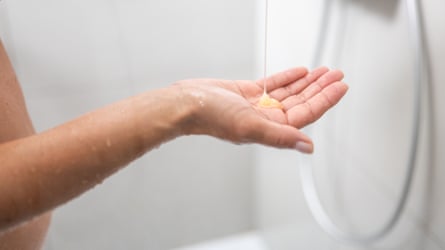Growing up, I washed my hair every day. I was washing my body every day, so I figured I should shampoo my hair daily too. Then, in my teens, a classmate with hair much thicker and more lustrous than mine told me shampoo was terrible – it strips your strands, she claimed, leaving your hair parched and fragile. Shampoo as little as possible, she advised. She herself only did it once a week.
I tried this for a couple of horrible months. All it accomplished was to make me look like something pulled out of a grease trap. I started washing my hair every other day, and have kept up that routine ever since.
But is shampoo actually bad for your hair? How often should one be using it? And which of the trillion types of shampoo should one use? We asked experts.
Is shampoo bad for your hair?
“I don’t believe that shampoo is inherently bad for hair,” says Yene A Damtew, a hairstylist and owner of Aesthetics Salon in Arlington, Virginia. “Cleansing your hair and scalp is essential for maintaining healthy hair.”
It is true that shampoo can strip away “natural oils that protect each hair follicle and the skin of the scalp”, says Dr Deeptej Singh, a board-certified dermatologist and the founder and owner of Sandia Dermatology.
But there is a “happy medium”, he says. The best solution is a Goldilocks approach: “Don’t overwash or underwash,” Singh says.
How often should people wash their hair?
Each person’s ideal shampoo schedule will depend on a variety of factors, says Singh. These include hair texture and type, whether it’s chemically treated, activity level, medications and weather. Generally, he says, the range is somewhere between once a day and once a week.
“If you have very fine or thin hair, you may need to wash more often, while those with thick or curly hair may need to wash less often,” says Dr Elizabeth Bahar Houshmand, a double board certified dermatologist and hair health expert.
 View image in fullscreen
View image in fullscreen
Permed, relaxed or color-treated hair should also be washed less often, as these treatments can make the hair more fragile.
Deciding when to wash your hair depends on a number of personal factors, such as odor and aesthetics. But going too long between washes, especially for those with oily scalps, can result in inflammation and an overproduction of yeast on the scalp that leads to itchiness and dandruff.
What sort of shampoos should people be using based on their hair types?
There are so many different types of shampoos that it can be difficult to know which to use. Should you go for a hydrating, clarifying, volumizing or color-protecting option?
“It depends on both your hair and scalp type,” says Houshmand.
skip past newsletter promotionSign up to Well Actually
Practical advice, expert insights and answers to your questions about how to live a good life
after newsletter promotion
For those with an oily scalp and hair, she recommends a clarifying or anti-dandruff shampoo. These prevent the scalp from becoming greasy, but restore enough hydration to the hair to prevent it drying out.
She also recommends a clarifying shampoo for those with braids, a weave or locs, but suggests diluting it with water for easier rinsing.
Normal scalps and hair benefit most from a hydrating shampoo that is gentle and balances hair’s natural moisture content. Houshmand says these shampoos often contain ingredients such as sodium gluconate, citric acid and sodium benzoate. “These cleanse the scalp and help to moisturize the length of your hair,” she says.
For hair that has been chemically treated and is prone to dryness and damage, Houshmand says she likes “reparative products with ceramides and proteins”. These restore hydration to the scalp and hair while repairing damage. She suggests looking for products that say “color-treated” and “nourishing”.
What is the correct way to shampoo?
After you wet your hair, Houshmand suggests using a dime-sized amount of shampoo. People with long, thick or curly hair may need more, or they may need to double shampoo.
“Start by focusing on the scalp,” says Damtew. Massaging your head gently removes any buildup of oil and products and stimulates blood circulation, she explains. Then, she says to “gradually work the product down the hair shaft to the ends”.
When you rinse, rinse thoroughly to ensure all shampoo has been removed. Any product residue “can cause buildup or dullness”, Damtew says.
To further protect your hair, follow up with a conditioner. This helps bind the hair fiber together, strengthening the hair.
And finally, keep in mind that hair health goes beyond the shower. “A healthy scalp and a balanced diet are key to promoting hair growth,” says Damtew. “It’s an inside-out approach.”
∎